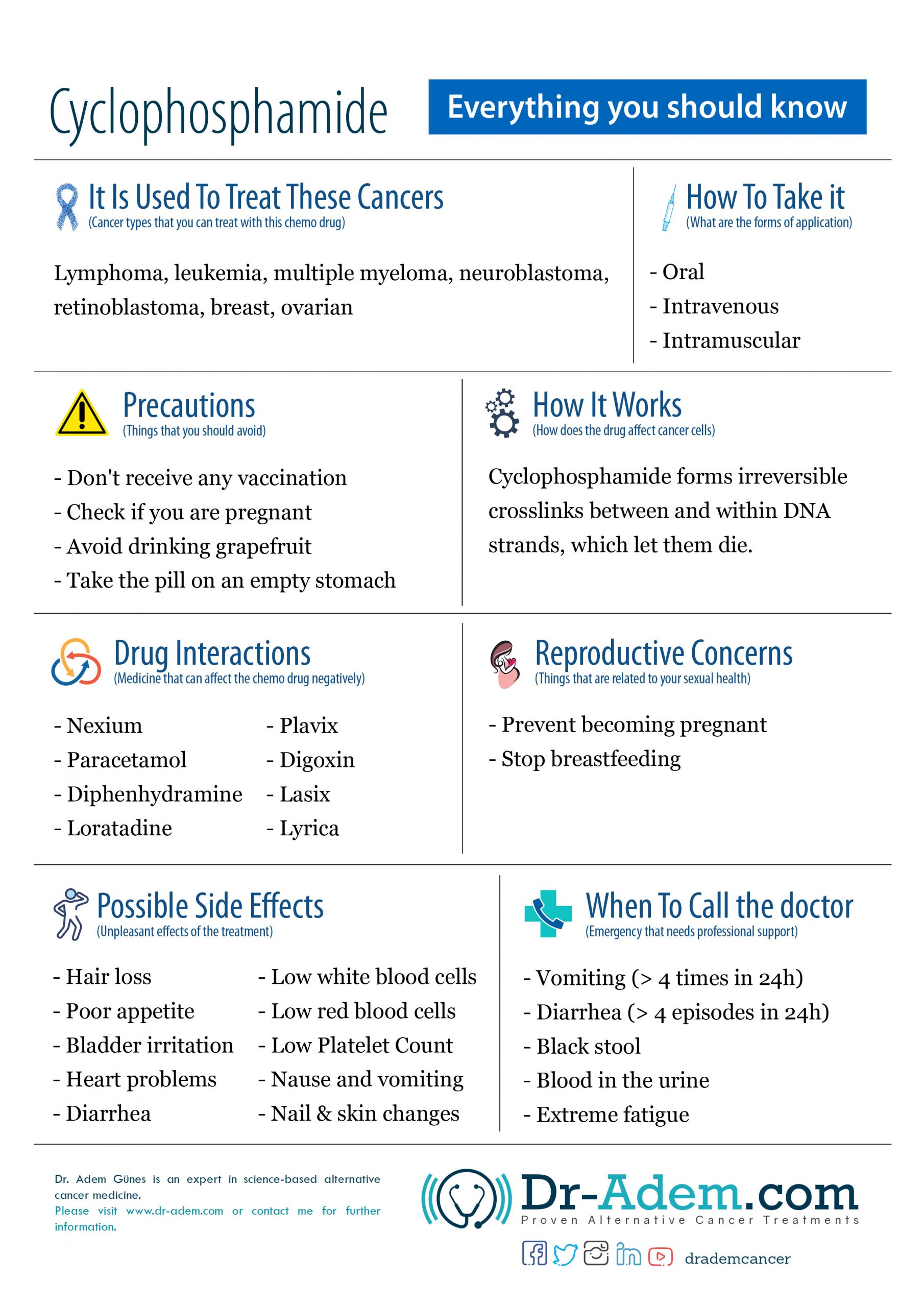Fact Sheet – Everything You Should Know
In this Cyclophosphamide fact sheet, you’ll get to know about the precautions, usage, possible side effects, and the types of cancer that you can treat with this chemo drug.

Embed this Infographic on your site:
<a href='https://dr-adem.com/cyclophosphamide-fact-sheet/'><img src='https://dr-adem.com/wp-content/uploads/2019/11/Cyclophosphamide2-scaled.jpg' alt='Cyclophosphamide Fact Sheet'/></a>Here’s the Cyclophosphamide fact sheet to get detailed information about Cyclophosphamide
It Is Used To Treat These Cancers
(Cancer types that you can treat with this chemo drug)
- Lymphoma
- Leukemia
- Multiple myeloma
- Neuroblastoma
- Retinoblastoma
- Breast
- Ovarian
How To Take it
(What are the forms of application)
- Oral
- Intravenous (infusions take usually around 60 minutes)
- Intramuscular (seldom)
- Non-vesicant drug
Precautions
(Things that you should avoid)
- Don’t receive any vaccination
- Check if you are pregnant
- Avoid drinking grapefruit
- Take the pill on an empty stomach
- Usually given with MESNA (a drug to prevent bladder toxicity)
- Ingest larger amounts of water after the treatment
- Let your doctor know if you have or suspect you have a bladder infection
- Let your doctor know if you have kidney or liver problems
- Avoid alcohol consumption during the treatment (especially if oral)
Mechanism of Action of Cyclophosphamide
(How does the drug affect cancer cells)
Cyclophosphamide belongs to the alkylating agents (Oxaphosphorine subgroup). It builds irreversible DNA crosslinks between different DNA strands but also within the same DNA strands, which lead to cellular apoptosis (programmed death). These drugs affect only cells with low levels of aldehyde dehydrogenase (which is mostly seen in bone marrow stem cells, liver and bowel lining cells).
Drug Interactions
(Medicine that can affect the chemo drug negatively)
- Nexium
- Paracetamol
- Diphenhydramine
- Loratadine
- Plavix
- Digoxin
- Lasix
- Lyrica
Reproductive Concerns
(Things that are related to your sexual health)
- Pregnancy prevention during and 6 months after the treatment (men and women)
- Stop breastfeeding
- Consider sperm freezing
Possible Side Effects
(Unpleasant effects of the treatment)
- Hair loss
- Loss of appetite
- Bladder irritation
- Bloody urine
- Heart problems
- Diarrhea
- Low white blood cells: raise the risk of bacterial infection
- Low red blood cells: can lead to fatigue, general lack of interest and drive to be active
- Low platelets: can lead to bleeding (nose, gums) and in extreme cases to internal bleeding (intestinal, brain, joints)
- Nausea and vomiting
- Nail & skin changes
- Fatigue
- Lung fibrosis
- Infertility
- Ovarian impairment
When To Call the doctor
(Emergency that needs professional support)
- Vomiting (>4 times in 24h): can lead to severe dehydration and electrolyte disbalance
- Diarrhea (>4 episodes in 24h): can also lead to severe dehydration and electrolyte disbalance
- Black stool: can be a sign of intestinal bleeding
- Blood in the urine
- Extreme fatigue: can be a sign of severe anemia (low blood cells)
- Fever > 37,8°C


